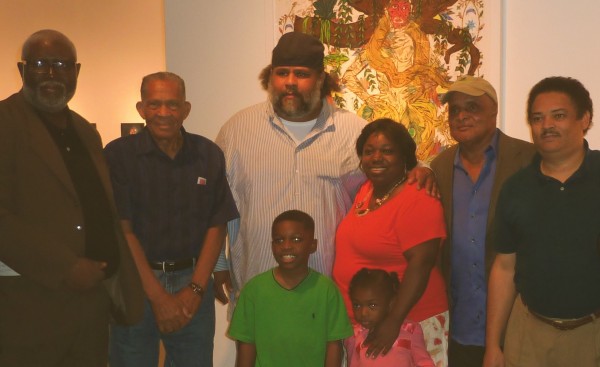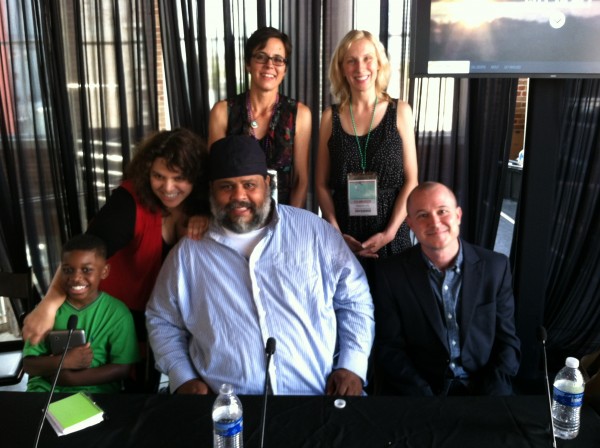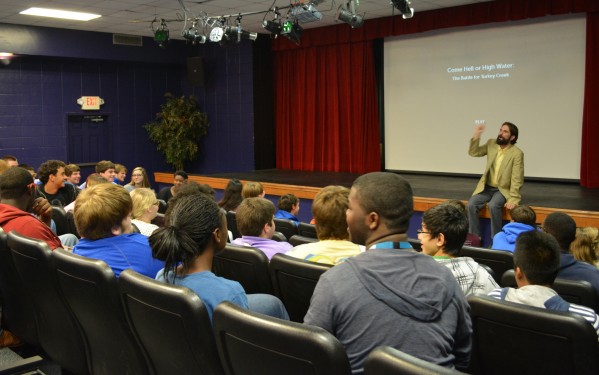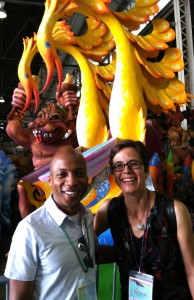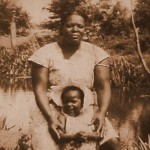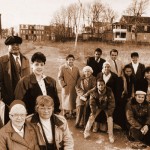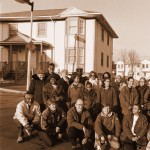Come Hell or High Water – Gulf Coast sendoff
UPDATE: The film received the 2013 New Orleans Film Festival Audience Award for Documentary Feature.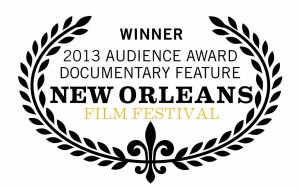
Come Hell or High Water: The Battle for Turkey Creek had its premiere Sunday at the New Orleans Film Festival, and the theater was full of old friends and new ones. Derrick Evans and Reilly Morse (Mississippi Center for Justice) joined me after the screening for a discussion moderated by filmmaker Luisa Dantas. Along with the cheers and laughter, some tears were shed, and I think we all felt a great relief that this day finally came and a new chapter has begun.
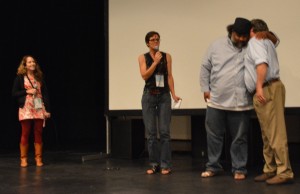
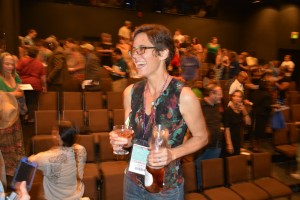 Derrick’s mother and aunt were there from Turkey Creek and a group came from Africatown, a Mobile, Ala., community settled by former slaves that faces many similar issues. The group was organized by Teresa Bettis, director of the Fair Housing Center and an advisor to the Gulf Coast Fund for Community Renewal and Ecological Health. Shana Griffin of the Gulf Coast Fund and Ada McMahon of Bridge the Gulf were there to show support and kick off a series of screenings being planned on the Gulf Coast. And intrepid volunteer Karen Savage was there to document and keep the Bridge the Gulf and Gulf Coast Fund networks informed.
Derrick’s mother and aunt were there from Turkey Creek and a group came from Africatown, a Mobile, Ala., community settled by former slaves that faces many similar issues. The group was organized by Teresa Bettis, director of the Fair Housing Center and an advisor to the Gulf Coast Fund for Community Renewal and Ecological Health. Shana Griffin of the Gulf Coast Fund and Ada McMahon of Bridge the Gulf were there to show support and kick off a series of screenings being planned on the Gulf Coast. And intrepid volunteer Karen Savage was there to document and keep the Bridge the Gulf and Gulf Coast Fund networks informed.
Earlier in the day, there were related events hosted by Chicken and Egg Pictures, which provided funding and mentorship for my film and two other projects at the festival — Can’t Stop the Water and Land of Opportunity. We were all on a panel with Judith Helfand of Chicken and Egg titled “Call & Response: Post-Disaster Storytelling on the Gulf Coast” that was moderated by Brian Boyles of the Louisiana Endowment for the Humanities. Later Ada McMahon was on a panel about the Land of Opportunity website, demonstrating how content from Bridge the Gulf is being featured on the site. It was so wonderful to share the film with such a great network of Gulf Coast artists and advocates.
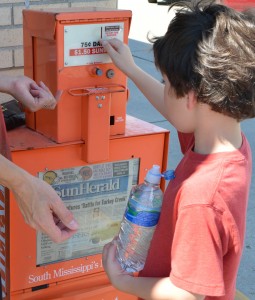 I wrote an earlier post about the fact that this trip began Thursday in Turkey Creek, where I screened the film at Mount Pleasant United Methodist Church. In Gulfport on Friday my seven-year-old son enjoyed seeing my face peeking out of the newspaper box and putting coins in to buy a copy. Anita Lee of the Sun Herald wrote a story announcing the upcoming festival screening: Documentary captures Turkey Creek community’s preservation battle in Gulfport.
I wrote an earlier post about the fact that this trip began Thursday in Turkey Creek, where I screened the film at Mount Pleasant United Methodist Church. In Gulfport on Friday my seven-year-old son enjoyed seeing my face peeking out of the newspaper box and putting coins in to buy a copy. Anita Lee of the Sun Herald wrote a story announcing the upcoming festival screening: Documentary captures Turkey Creek community’s preservation battle in Gulfport.
Later that morning, Mississippi Public Broadcasting radio reporter Evelina Burnett attended a preview screening at Gulfport High School, where teacher Hardy Thames has been introducing his students to the history of Turkey Creek. She interviewed senior Alliyauh Walker: “… part of history is right there in front of your face and you see it every day. And it’s just amazing you have a piece of history and don’t even know it.” Derrick’s mother, Rev. Lettie Evans-Caldwell, and Judy Steckler with the Land Trust for the Mississippi Coastal Plain answered questions about how students might get involved in the work to protect Turkey Creek. The story aired Monday on MPB radio: Spotlight Shines on Historic Turkey Creek Community.
It was a terrific sendoff for the film, and I only regret that some who were so important to the project couldn’t be there. At the church I shared my sadness that many of the elders who so generously shared their memories and perspectives are gone, including Rev. Calvin Jackson, Rev. Harry Tartt, Katie Booth, Dozier Hines, Netterine Theodore and Albert Theodore.
At the festival screening I tried to pay tribute to the many collaborators who made the film a reality (including co-editor Dawn Logsdon and field producer Remale James, who were able to attend the screening), but I’d like to make special mention of several people here.
If not for Jane Greenberg I might still be in the editing room, or I may have given up. As producer and editor, she saw us through many tough spots and lent her enormous creativity and practical get-it-done mentality to make the film a reality. Co-editor Bill Anderson stepped in at a time when we were preparing to bring the rough cut to the Sundance Institute Documentary Editing and Story Lab and lent his storytelling skill and humor to help us turn the corner toward a fine cut, with the help of an incredible team of creative advisors there. Composer Derrick Hodge was a joy to work with and I’m thankful for his commitment to understand and do justice to the story with his music. Thank you also to additional editors Sari Gilman and Ken Schneider, who helped us work through storytelling challenges at critical moments.
And finally, I want to pay tribute to the scenes on the cutting-room floor. Scenes with Derrick’s Sunday school teacher Miss Net (Netterine Theodore) telling Derrick in 2001 that he’ll return home again when he’s needed and guiding me through her ravaged home after Katrina still play vividly in my mind, though they are no longer in the film. Someday soon these and other important moments will play in another form, as DVD/web extras and features on the Land of Opportunity site.
Thanks to all! Now on to Power Shift with Working Films’ Reel Power project!

